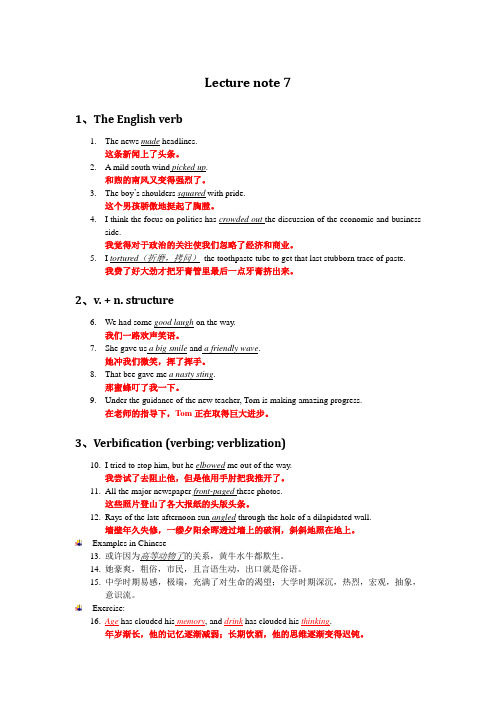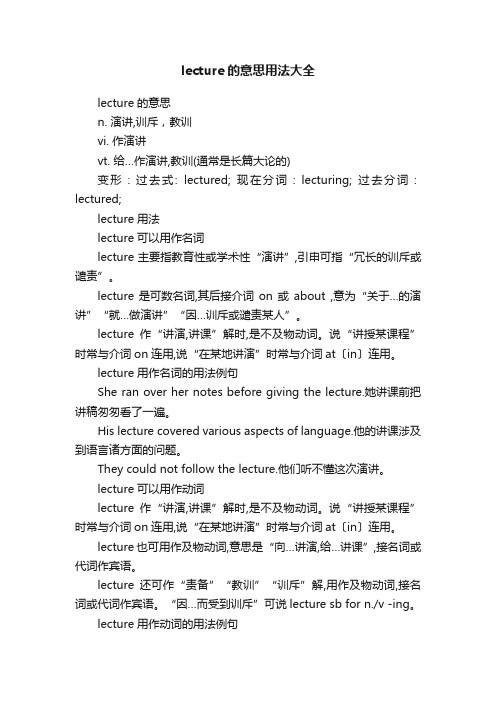Lecture_7_句序调整翻译
【调整】英译汉翻译词序和句序的调整技巧

【关键字】调整英译汉翻译词序和句序的调整技巧英译汉的翻译方法和技巧是建立在英汉两种语言的对比之上的。
这两种语言在词汇和句法方面的一些表达手段上各有其特点。
语序调整主要指词序、句序两方面的调整。
首先我们谈谈词序的调整。
英汉语句中的主要成分主语、谓语、宾语或表语的词序基本上是一致的,但各种定语的位置和各种状语的次序在英、汉语言中则有同有异。
汉语说“他正在卧室里睡觉”,而在英语中却说He is sleeping in the bedroom.(他睡觉在卧室。
);英语汉语都说“他出生于北京”,“He was born in Beijing”。
一、定语位置的调整1.单词作定语英语中,单词作定语时,通常放在它所修饰的名词前,汉语中也大体如此。
有时英语中有后置的,但译成汉语时一般都前置。
something important(后置)重要的事情(前置)如果英语中名词前的定语过多,译文中则不宜完全前置,因为汉语不习惯在名词前用过多的定语。
a little,yellow,ragged beggar(前置)一个要饭的,身材矮小,面黄肌瘦,衣衫褴褛(后置)2.短语作定语英语中,修饰名词的短语一般放在名词之后,而汉语则反之,但间或也有放在后面的,视汉语习惯而定。
their attempt to cross the river(后置)他们渡江的企图(前置)the decimal system of counting(后置)十进制计算法(后置)2、状语位置的调整1.单词作状语英语中单词作状语修饰形容词或其他状语时,通常放在它所修饰的形容词或状语的前面,这一点与汉语相同。
He was very active in class.(前置)他在班上很活跃。
(前置)英语中单词作状语修饰动词时,一般放在动词之后,而在汉语里则放在动词之前。
Modern science and technology are developing rapidly.(后置)现代科学技术正在迅速发展。
英汉互译 lecture note 7(仅供参考)

Lecture note 71、The English verb1.The news made headlines.这条新闻上了头条。
2. A mild south wind picked up.和煦的南风又变得强烈了。
3.The boy’s shoulders squared with pride.这个男孩骄傲地挺起了胸膛。
4.I think the focus on politics has crowded out the discussion of the economic and businessside.我觉得对于政治的关注使我们忽略了经济和商业。
5.I tortured(折磨,拷问)the toothpaste tube to get that last stubborn trace of paste.我费了好大劲才把牙膏管里最后一点牙膏挤出来。
2、v. + n. structure6.We had some good laugh on the way.我们一路欢声笑语。
7.She gave us a big smile and a friendly wave.她冲我们微笑,挥了挥手。
8.That bee gave me a nasty sting.那蜜蜂叮了我一下。
9.Under the guidance of the new teacher, Tom is making amazing progress.在老师的指导下,Tom正在取得巨大进步。
3、Verbification (verbing; verblization)10.I tried to stop him, but he elbowed me out of the way.我尝试了去阻止他,但是他用手肘把我推开了。
11.All the major newspaper front-paged these photos.这些照片登山了各大报纸的头版头条。
Lecture_7_句序调整翻译

The librarians have compiled a card-index catalogue so that they can afford facilities for reference. 为便于参考起见,图书馆馆员们编制了索引目 录卡。 No matter how hard he tried, he failed at last. 不管他怎样努力,最后还是没有成功。
参考译文:
这次周年纪念会应该是一个老老实实地评估 我们过去的失误的时机,同时也应该是一个表 达我们有同样决心要做好今后工作的时机。这 样,我们就可免遭挫折,并可把这次周年纪念 变成一种鼓舞和成就。当我讲这番话时,我相 信---今天上午我们听到的发言也使我相信--我是代表联合国每一位真诚和严肃的代表讲话 的。
一、英汉词序差异
English sentence patterns: Minor—Major Near—Far Specific---General Weak---Strong 汉语一般把重要的、语气强的词语紧靠中心词,而英语恰 恰相反。 His address is 3612 Market Street,Philadelphia, PA. 19109,USA. 他的地址是美国宾夕法尼亚州费城市场街3612号,邮政 编码19104。 My uncle passed away in hospital at 2: 30 a. m. on September 12,1999. 我的伯父于1999年,月12日凌晨2点30分在医院逝世。 一定要分清敌我。 We must draw a clear distinction between ourselves and the enemy.
lecture的意思用法大全

lecture的意思用法大全lecture的意思n. 演讲,训斥,教训vi. 作演讲vt. 给…作演讲,教训(通常是长篇大论的)变形:过去式: lectured; 现在分词:lecturing; 过去分词:lectured;lecture用法lecture可以用作名词lecture主要指教育性或学术性“演讲”,引申可指“冗长的训斥或谴责”。
lecture是可数名词,其后接介词on或about ,意为“关于…的演讲”“就…做演讲”“因…训斥或谴责某人”。
lecture作“讲演,讲课”解时,是不及物动词。
说“讲授某课程”时常与介词on连用,说“在某地讲演”时常与介词at〔in〕连用。
lecture用作名词的用法例句She ran over her notes before giving the lecture.她讲课前把讲稿匆匆看了一遍。
His lecture covered various aspects of language.他的讲课涉及到语言诸方面的问题。
They could not follow the lecture.他们听不懂这次演讲。
lecture可以用作动词lecture作“讲演,讲课”解时,是不及物动词。
说“讲授某课程”时常与介词on连用,说“在某地讲演”时常与介词at〔in〕连用。
lecture也可用作及物动词,意思是“向…讲演,给…讲课”,接名词或代词作宾语。
lecture还可作“责备”“教训”“训斥”解,用作及物动词,接名词或代词作宾语。
“因…而受到训斥”可说lecture sb for n./v -ing。
lecture用作动词的用法例句It was a shame for me to be lectured in front of the whole class.当着整个班级的面被训斥了一顿,真让我感到羞辱。
He lectured to his students on modern writers.他给学生们讲了关于现代作家的一课。
lecture用法最全详解(含习题)

2.lecturelecture /ˈlektʃə(r)/ 词频4n. 讲座;讲课;教训. vi. (开)讲座;讲课. vt. 训斥派:lecturer 词频2 n.演讲者;(大学)讲师①高义频vi.&n.(尤指大学中的)讲座;讲课;演讲go to/attend a lecture 听讲座deliver/give a lecture做讲座a lecture on/about 关于……的讲课/训斥e.g. He lectures on literature at Manchester University. 他在曼彻斯特大学教文学。
②低义频vi.&n.教训;训斥lecture sb. about/on...因……训斥某人give sb. a lecture 给某人一个教训e.g. He’s always lecturing me about the way I dress. 他总是对我的穿着说三道四。
e.g. I know I should stop drinking-don’t give me a lecture about it.我知道我该戒酒,别教训我了。
1.单词拼写(1)I went to the ___(讲座) he gave in the hall.(lecture)(2)He learned a ___(教训)from this thing-he should stop smoking for his health.(lecture)(3)Professor Smith will give a l___ in Fudan University this evening about the history of English.(lecture)(4)She suffered a bad cold. As a result, she missed the ___(讲座) she liked very much.(lecture)(5)She preferred that we should have the discussion right after the ___(讲座).(lecture)(6)Please stop___(lecture) me! I know I should quit smoking.2.语法填空(1)The ___ (lecture) spoke very clearly so that we could hear every word.(lecturer) 3. 完成句子(1)He ___ ___ ___ ___time management to first-year students___ ___ ___ ___.他在报告厅给一年级学生做关于时间管理的讲座。
lecture 7 汉英句式翻译

3. “把”字句的翻译
• 1)处置式“把”字句 • 赵伯韬摇摇头,把雪茄从嘴唇上拿开,似乎想说话了。 (<子夜>) • Chao Po-tao shook his head and took the cigar out of his mouth as if he was going to speak at last. • 我想把两只手伸出去拥抱她一回。(郁达夫《春风沉 醉的晚上》) • I longed to stretch out my arms and embrace her. • 今晚恐怕给什么事把他绊住了。(巴金《月夜》) • Maybe something’s delaying him. • 把综合经济部门改组为宏观调控部门。 • The function of the department in charge of comprehensive economical management should be shifted to macroeconomic control.
2). 使役式“把”字句
• • • • • “把”字句后的被处置者往往是逻辑主语 牛油奶酷把许多美国人吃成了大胖子 Butter and cheese make many Americans mountains of fat. 一口气讲了这些话把她累得喘息起来。 She said all this without a pause, which made her gasp for air. • 月光如流水,把他的头发洗得好清爽。(巴金《月 夜》) • Its silvery beams, like cool water, make his hair shine.
• 新媳妇哭了一天一夜,头也不梳,脸也不洗,饭也不吃,躺在炕 上(kang/ heatable brick bed),谁也叫不起来,父子两个没了办法。 (赵树理《小二黑结婚》) • The daughter in law was irritated so much that she cried for a whole day and night, refusing to comb hair, wash her face, or take any food. She lay on the kang, and no one could persuade her to get up. Her husband and father-in-law were at their wit’s end as to what to do. • 草地的气候就是怪,明明是月朗星稀的好天气,忽然一阵冷风吹 来,浓云象从平地上冒出来(spring up out of the ground),霎时把 天遮得严严的,接着就有一场暴雨,夹杂着栗子(chestnut)般大小 的冰雹,不分点地倾泻下来。(王愿坚《七根火柴》) • The weather was peculiar/unusual in the marshy grasslands. A moment ago it had been a clear moonlight. But suddenly a cold wind had risen, and heavy clouds, which seemed to spring up out of the ground, covered the sky. Then rain had come pouring down, mixed with/accompanied by hailstones as big as chestnuts.
汉英译课件之 句子翻译之语序调整
当名词中心词之前出现几个属于不同层次的形容词作修饰语时,常常涉及词序问题。一般按下列词序排列:表示说话人评价的形容词—表示大小、形状、新旧的形容词—表示颜色的形容词—表示国别、来源、材料的形容词—表示用途、目的的形容词或分词、名词等类别词。
The charming old English church
那位老人长时间住在那幢老房子里。 The old man has lived in the old house for a long time. 我们相信,在新的一年里,通过双方的努力,我们的业务和友好合作关系会得到发展。 We believe we will be able to develop business relations and friendly cooperation through our common efforts in the coming year. 经过仔细讨论,决定立即开始修建这条铁路。 After a thorough discussion, we decided to start building the railway right away.
3
2
4
1
பைடு நூலகம்
就分句间的相对位置而言,汉语的顺序相对比较固定,一般按照先因后果,语序与时序相一致的原则。
A board creaked as I crossed the floor.
而英语比较灵活,语序与时序常常不一致。
我走过地板时,一块板子吱吱作响。
你丈夫念书,你挣钱养家,他不会感到不自在吧。
I hope your husband doesn’t feel bad about it, with him studying and you earning money. 女主人已经离开人世,再没有人喂它了。它好像已经意识到这一点。
Lecture7范畴词的翻译.ppt
热情→热情大方 思想→思想意识 道德→道德品质 骄傲→骄傲自大 枯燥→枯燥无味 卑鄙→卑鄙无耻 沉默→沉默寡言 闲情→闲情逸致 坦然→坦然自若 谨慎→谨慎小心
26
3. 译名词复数时增加表示门类、数量概念 的词 可数名词是复数形式时,可根据具体情 况增加表示门类、数量概念的词。这些 概念词常是“们、一些、许多、这些、 那些、各种、各类、各项、几个”等。
We shall accomplish this by a gradual transition. (T)
2019/10/31
11
发挥……功能,起到……作用
3)这项措施将对投机倒把活动起到限制作用. This measure will have a restrictive effect on the activities of speculators. (F)
2019/10/31
静止→静止状态 混乱→混乱局面 测量→测量方法 净化→净化过程 重复→重复现象 管理→管理方式 计算→计算方法 住宿→住宿问题 连接→连接部分 饱和→饱和状态 准备→准备工作 补救→补救措施 修改→修改方案
24
2.译抽象名词时增加另一个抽象名词
在抽象名词后面跟上另一个抽象名词来加 强语气,强调说明前一个名词,两个名 词互相解释。
2) He had surfaced with less visibility in the policy decisions. 在决策过程中,他已经不那么抛头露面了。
3) High blood pressure is a contradiction for this drug. 高血压患者忌服此药。
2019/10/31
29
5. 用具体的词语阐释抽象的词义
汉英翻译方法句序的调整和否定句翻译
调整句序
根据英语的表达习惯,合理调整汉语原句的句序,使 译文更加流畅。
简化句式
在保证信息准确传达的前提下,适当简化句式,提高 译文的易读性。
灵活运用翻译技巧,提高译文质量
直译与意译ຫໍສະໝຸດ 01根据具体情况选择直译或意译,直译保留原文形式,意译侧重
传达原文含义。
详细描述
在汉语中,否定转移是一种常见的修辞手法 ,通过将否定形式放在句首或句末来强调肯 定意义。在汉英翻译中,需要将否定转移的 表达方式准确翻译为英语中的相应表达方式 ,如使用“not…but…”等结构来表达否定 转移的意义。
04
汉英翻译中的特殊句式处理
无主语句的翻译
无主语句
在汉语中,无主语句是一种常见的句式,即句子中没有明确的主语。在汉英翻译中,为了 使译文符合英语语法规则和表达习惯,需要适当地添加主语或者采用被动语态来处理无主 语句。
长句的翻译
长句
在汉英翻译中,长句的处理是一个难 点。长句是指结构复杂、包含多个从 句和修饰语的句子。在翻译长句时, 需要仔细分析句子结构,理清逻辑关 系,按照英语的表达习惯进行重新组 织。
总结词
长句的翻译需要仔细分析句子结构, 理清逻辑关系,按照英语的表达习惯 进行重新组织。
详细描述
在处理长句时,可以采用分译法、顺 序调整法、断句法等方法进行翻译。 分译法是将长句拆分成若干个短句进 行翻译;顺序调整法是根据英语表达 习惯重新组织句子结构;断句法是在 长句中插入适当的标点符号断开句子 ,便于理解和翻译。同时,需要注意 保持原文的语义和语气,以及符合英 语语法规则和表达习惯。
分译与合译
总结词
将汉语原句拆分或合并进行翻译。
lecture翻译技巧八顺序和逆序法
1. The dockers were seen unloading the chemical fertilizer from S.S. “Apollo”.
2. The Finnish Trade Mission was given a warm welcome by their counterparts.
我们天天在教室里认真学习。
2. His address is 518 Wenhua Road, Guzan Town, PA626001, Kangding. 他的地址是康定县姑咱镇文化路518号,邮编编码 626001。
3. They were badly defeated at Luding in November, 1945. 他们于1945年11月在泸定附近大败。
+post-) both his two sisters (pre- + central + post-)
我的三位朋友 她的许多本书
Fourth, general principal for placing several attributive modifiers before noun in Chinese:
predeterminer + central determiner + postdeterminer
all the four teachers (pre- + central + post-) all your three books (pre- + central + post-) all these last few days (pre-+central+post-
